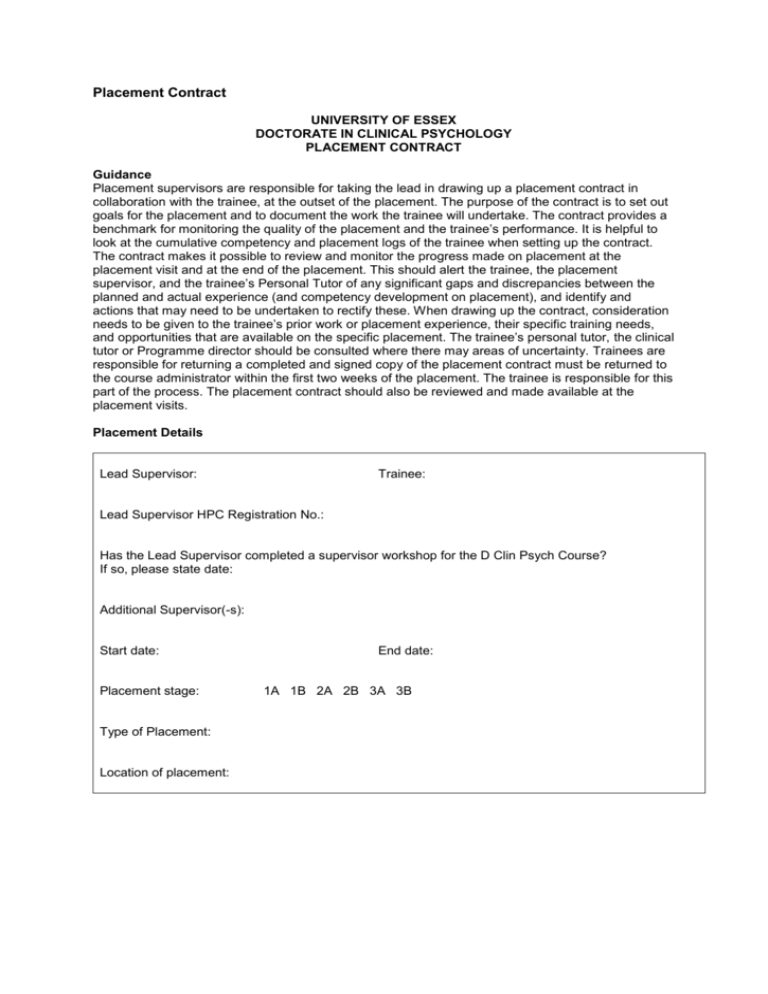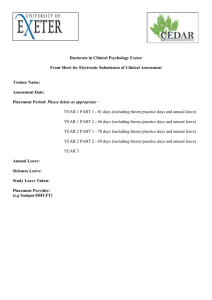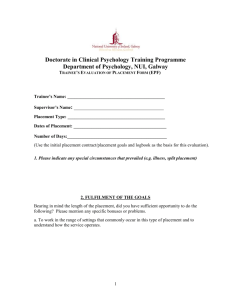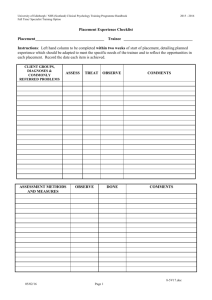Placement contract template
advertisement

Placement Contract UNIVERSITY OF ESSEX DOCTORATE IN CLINICAL PSYCHOLOGY PLACEMENT CONTRACT Guidance Placement supervisors are responsible for taking the lead in drawing up a placement contract in collaboration with the trainee, at the outset of the placement. The purpose of the contract is to set out goals for the placement and to document the work the trainee will undertake. The contract provides a benchmark for monitoring the quality of the placement and the trainee’s performance. It is helpful to look at the cumulative competency and placement logs of the trainee when setting up the contract. The contract makes it possible to review and monitor the progress made on placement at the placement visit and at the end of the placement. This should alert the trainee, the placement supervisor, and the trainee’s Personal Tutor of any significant gaps and discrepancies between the planned and actual experience (and competency development on placement), and identify and actions that may need to be undertaken to rectify these. When drawing up the contract, consideration needs to be given to the trainee’s prior work or placement experience, their specific training needs, and opportunities that are available on the specific placement. The trainee’s personal tutor, the clinical tutor or Programme director should be consulted where there may areas of uncertainty. Trainees are responsible for returning a completed and signed copy of the placement contract must be returned to the course administrator within the first two weeks of the placement. The trainee is responsible for this part of the process. The placement contract should also be reviewed and made available at the placement visits. Placement Details Lead Supervisor: Trainee: Lead Supervisor HPC Registration No.: Has the Lead Supervisor completed a supervisor workshop for the D Clin Psych Course? If so, please state date: Additional Supervisor(-s): Start date: Placement stage: Type of Placement: Location of placement: End date: 1A 1B 2A 2B 3A 3B Practical Arrangements State day and time of regular formal supervision with lead supervisor (please note minimum of 1 hour formal supervision and at least 3 hours of informal contact time per week between trainee and supervisor is required by the BPS and HPC) State time and amount of formal supervision. Give details of supervision that will be provided by other colleagues (e.g. family therapy team supervision, specialist supervision for specific client work such as for psychotherapy or CAT, team clinical discussions or case presentations). Day and time for regular supervision Arrangements for contacting supervisor in the event of a difficulty arising in between scheduled supervision times Arrangement for additional supervision (if applicable) Arrangements for supervisor absence (e.g. during periods of annual leave) Arrangements for office space and secretarial support Plans for induction and orientation – give details of Arrangements that will be made for orientation to the service. Orientation of the trainee to the placement. Service philosophy and context. Any service organisational or system issues that the trainee will need to understand. Any special induction that will be required Specify the background knowledge that the trainee to be required acquire prior to having client contact. Methods of learning available Observation of supervisor Supervisor observation of trainee Joint Work Audiotape Videotape Observation room Library Yes/No Yes/No Yes/No Yes/No Yes/No Yes/No Yes/No Strengths, Limitations and placement goals Please note any perceived strengths or limitations of the trainee, supervisor and placement that should be considered in planning the placement. Trainee Supervisor Placement Strengths Learning Needs or limitations Goals to address trainee’s learning needs Competencies Development and Specific Training Needs These should be based on a consideration of specific competencies that need to be developed as well as experiences that need to be acquired State experiences and opportunities that will be available on placement. Identify the core competencies that will be developed on placement (e.g. engagement, assessment, formulation, intervention, evaluation, research skills related to service related project, communication, teaching, inter-professional working, professional practice, reflective practice) Identify approach or specific competencies that will be developed on placement (i.e. therapeutic approach or approaches). Clinical Skills and Models Give details of core clinical skills that trainee will develop in placement (e.g. generic interview, testing). Give details of assessment methods used on placement (e.g. clinical interviews, psychometric assessments, observation, semi-structured interviews, risk assessment, functional analysis, and psychotherapy assessment). Give details of the therapeutic models and approaches that trainee will be exposed to and apply on placement (e.g. CBT, Systemic, groups, psychodynamic, CAT). Are care planning systems used on placement (it is essential that the trainee gain experience of care planning systems, either directly or through observation -contributing to community care assessments, the care programming approach, etc). Direct Client work: Trainees will normally be expected to work with 6-8 clients at any one time. Give details of: Range of clients Group work Diversity of client work and client backgrounds Work with family carers Indirect Client work Give details of: Work with family carers Work with 'professional' carers Work with other professionals Experience of MDT. Work within systems and organisations Give details of placement experience that will lead to a trainee gaining experience in: Team Meetings: State team meetings that will be attended by the trainee. Knowledge of service organisation – Trainees need to gain knowledge of the role of the psychologist at the level of the service organisation e.g.: local service development, implementing community care legislation. Indirect work/consultation Teaching - It is very desirable for the trainee to undertake some teaching or a formal presentation (e.g. a workshop, a "journal club", teaching other professionals, a staff team). Research (Service Related Project or larger research project if applicable) Give details of supervision and practical arrangements for the research if this is being carried out on placement. Evaluating Treatment Outcome - (e.g. Service user feedback, standardized measures, self-report). Expectations re: report writing and correspondence The aim should be to specify your expectations about the ways in which trainees document their work, whether it is in clinical notes, clinical reports or letters to referrers. It is general policy for all letters and reports to be countersigned by the supervisor. In order to avoid any misrepresentation trainees should always sign themselves as “Trainee Clinical Psychologist”. Arrangements for ending the placement Give details about the procedures or practical steps that will be followed when ending the placement. There should be a formal end of placement review before the end of placement at which the completed supervisor feedback form and trainee evaluation form are complete. The trainee should also then fill in the log book with the supervisor to review progress over the year. OPTIONAL Learning Goals Competency Goal Activity where this goal will be achieved Critical Appraisal of Knowledge Reflexivity Integration of Theoretical Models Professional Conduct Clinical Competence Creative and Critical Practice Contextual Understanding User Involvement Communication Multi-professional working Personal Care Continuing Professional Development Diversity Accessing IT Critiquing Research Findings Both trainee and supervisor should sign the contract and return a copy to the University within the first two weeks of the start of the placement. Other Relevant Information (A/L, conferences) Trainee Name: Signed: Date: Supervisor Name: Signed: Date: FOR PROGRAMME TEAM USE ONLY: Reviewed by Programme team member Programme Team member name: Signed: Date:







